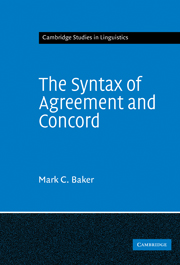Book contents
- Frontmatter
- Contents
- Acknowledgments
- List of abbreviations and conventions
- 1 Introduction: category distinctions as a window on the theory of agreement
- 2 Basic agreement and category distinctions
- 3 The unity of verbal and adjectival agreement
- 4 Explaining the restriction on person agreement
- 5 Parameters of agreement
- Appendix: Table of languages and their agreement properties
- References
- Index
5 - Parameters of agreement
Published online by Cambridge University Press: 12 January 2010
- Frontmatter
- Contents
- Acknowledgments
- List of abbreviations and conventions
- 1 Introduction: category distinctions as a window on the theory of agreement
- 2 Basic agreement and category distinctions
- 3 The unity of verbal and adjectival agreement
- 4 Explaining the restriction on person agreement
- 5 Parameters of agreement
- Appendix: Table of languages and their agreement properties
- References
- Index
Summary
Introduction: parameters and other kinds of variation
In the preceding chapters of this book, I concentrated on the putatively universal conditions on agreement – those conditions that shape agreement and concord in all natural human languages. But agreement is a relatively superficial phenomenon, where one expects to see variation as well as uniformity.
It is perfectly clear that there is significant variation at some levels. The most obvious type is the variation between languages with a great deal of agreement, where agreement is central to the expression of grammatical relationships, and languages where agreement is either absent or peripheral to the expression of grammatical relationships. The first class of languages are the head-marking languages of Nichols 1986, including the polysynthetic languages of Baker 1996; the second class of languages includes the isolating languages and pure dependent-marking languages. I have modeled this dimension of variation in part by saying that languages can vary as to whether or not functional heads like FA or FN are generated above APs and NPs, and in part by saying that functional heads may or may not be specified as being probes, which look for features to agree with. For example, Ps, Ts, and vs are functional heads with semantic content that agree with nearby DPs/NPs in some languages but not others. A language has lots of agreement if it includes suitable functional heads in its syntactic structures and those functional heads are designated as being probes. In contrast, a language has little or no agreement if either functional heads are not projected, or if the functional heads that are present do not count as probes.
- Type
- Chapter
- Information
- The Syntax of Agreement and Concord , pp. 153 - 245Publisher: Cambridge University PressPrint publication year: 2008

